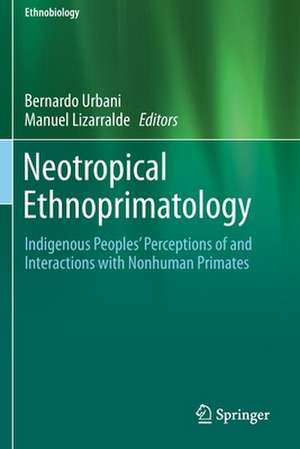Neotropical Ethnoprimatology: Indigenous Peoples’ Perceptions of and Interactions with Nonhuman Primates: Ethnobiology
Editat de Bernardo Urbani, Manuel Lizarraldeen Limba Engleză Paperback – 26 aug 2021
“This book… provides a historical benchmark for all subsequent research in ethnoprimatology in the Neotropics and beyond.”
— Leslie E. Sponsel, University of Hawai´i at Mānoa.
| Toate formatele și edițiile | Preț | Express |
|---|---|---|
| Paperback (1) | 950.84 lei 6-8 săpt. | |
| Springer International Publishing – 26 aug 2021 | 950.84 lei 6-8 săpt. | |
| Hardback (1) | 956.99 lei 6-8 săpt. | |
| Springer International Publishing – 24 mar 2020 | 956.99 lei 6-8 săpt. |
Preț: 950.84 lei
Preț vechi: 1159.56 lei
-18% Nou
Puncte Express: 1426
Preț estimativ în valută:
182.00€ • 197.76$ • 152.98£
182.00€ • 197.76$ • 152.98£
Carte tipărită la comandă
Livrare economică 21 aprilie-05 mai
Preluare comenzi: 021 569.72.76
Specificații
ISBN-13: 9783030275068
ISBN-10: 303027506X
Ilustrații: XXXI, 396 p. 76 illus., 54 illus. in color.
Dimensiuni: 155 x 235 mm
Greutate: 0.6 kg
Ediția:1st ed. 2020
Editura: Springer International Publishing
Colecția Springer
Seria Ethnobiology
Locul publicării:Cham, Switzerland
ISBN-10: 303027506X
Ilustrații: XXXI, 396 p. 76 illus., 54 illus. in color.
Dimensiuni: 155 x 235 mm
Greutate: 0.6 kg
Ediția:1st ed. 2020
Editura: Springer International Publishing
Colecția Springer
Seria Ethnobiology
Locul publicării:Cham, Switzerland
Cuprins
Foreword.- Neotropical Ethnoprimatology: An Introduction.- Part I. Mesoamerica.- 1. Perception and Uses of Primates among Popoluca Indigenous People of Los Tuxtlas, Mexico.- 2. Mental State Attribution to Nonhuman Primates and Other Animals by Rural Inhabitants of the Community of Conhuas near the Calakmul Biosphere Reserve in the Yucatan Peninsula, Mexico.- 3. Local Knowledge and Cultural Significance of Primates (Ateles geoffroyi and Alouatta pigra) among Lacandon Maya from Chiapas, Mexico.- 4. Representation and Signification of Primates in Maya-Q´eqchi´ Cosmovision and Implications for their Conservation in Northwestern Guatemala.- Part II. South America.- 5. Ethnoprimatology of the Tikuna in the Southern Colombian Amazon.- 6. Frugivorous Monkeys Feeding a Tropical Rainforest: Barí Ethnobotanical Ethnoprimatology in Venezuela.- 7. Memories, Monkeys and the Mapoyo People: Rethinking Ethnoprimatology and Eco-Historical Contexts in the Middle Orinoco, Venezuela.- 8. Co-ecology ofJotï, Primates and Other People: A Multi-Species Ethnography in the Venezuelan Guayana.- 9. Primates in the lives of the Yanomami people of Brazil and Venezuela.- 10. Kixiri and the Origin of Day and Night: Ethnoprimatology among the Waimiri Atroari Amerindians of Central Amazonia, Brazil.- 11. Linguistic, Cultural, and Environmental Aspects of Ethnoprimatological Knowledge among the Lokono, Kari'na, and Warao of the Moruca River (Guyana).- 12. Relationships between Scientific Ecology and Knowledge of Primate Ecology of Wapishana Subsistence Hunters in Guyana.- 13. Past, Present and Future of Secoya Ethnoprimatology in the Ecuadorian Amazonia.- 14. The Importance of Nonhuman Primates in Waorani Communities of the Ecuadorian Amazon.- 15. Monkeys in the Wampis (Huambisa) Life and Cosmology in the Peruvian Amazonian Rainforest.- 16. The White Monkey and the Sloth or Pelejo Monkey: Primates in the Social and Cultural Configurations of the Shawi People of Northwestern Peru.- 17. Importanceof Primates to Tacana Indigenous Subsistence Hunting in the Bolivian Amazon.- 18. When Monkeys were Humans: Narratives of the Relationship between Primates and the Toba (Qom) People of the Gran Chaco of Argentina.- Index.
Notă biografică
Bernardo Urbani is an Associate Researcher at the Center for Anthropology of the Venezuelan Institute for Scientific Research. His research interests are Neotropical primate ecology and behavior, history of primatology, ethnoprimatology/archaeoprimatology, and primate conservation. He has received the Early Career Achievement Award of the American Society of Primatologists and the Martha J. Galante Award of the International Society of Primatology. He has also been elected member of the Global Young Academy.
Manuel Lizarralde is an Associate Professor at the Department of Botany and Environmental Studies Program at Connecticut College. His principal research focus is the botanical and ecological knowledge of indigenous peoples of the tropical rainforest. His research focus is the Barí people of Venezuela with 34 months of fieldwork over the last 29 years. He has also done ethnobotanical research with the Matsigenka of Peru and is the author of an index and map of South American indigenous languages.
Textul de pe ultima copertă
Ethnoprimatology is situated at the intersection between the biological and cultural subfields of anthropology. Research on the interface between human and nonhuman primates has been steadily increasing since 1997, when the term ethnoprimatology was first coined. Although there have been studies on human–nonhuman primate interactions in the tropical Americas, no single comprehensive volume has been published that integrates this information to fully understand it in this region. Eighteen novel chapters written by outstanding scholars with various backgrounds are included in this edited volume. They refer to the complex interconnections between different indigenous peoples with New World monkeys that sympatrically share their ancestral territories. Geographically, the range covers all of the Neotropics, from southern Mexico through northern Argentina. This work includes topics such as primates as prey and food, ethnozoology/ethnoecology, cosmology, narratives about monkeys, uses of primates, monkeys as pets, and ethnoclassification. Multiple views as well as diverse theoretical and methodological approaches are found within the pages. In sum, this is a compendium of ethnoprimatological research that will be prized by anthropologists, ethnobiologists, primatologists, conservationists, and zoologists alike.
“This book… provides a historical benchmark for all subsequent research in ethnoprimatology in the Neotropics and beyond.”
— Leslie E. Sponsel, University of Hawai´i at Mānoa.
“This book… provides a historical benchmark for all subsequent research in ethnoprimatology in the Neotropics and beyond.”
— Leslie E. Sponsel, University of Hawai´i at Mānoa.
Caracteristici
First comprehensive volume on the ethnoprimatology of the tropical Americas Covers a unique, large geographical spectrum with manuscripts from Argentina, Bolivia, Brazil, Colombia, Ecuador, Guatemala, Guyana, Mexico, Peru, and Venezuela Explores a wide range of topics from mythology and cosmology to hunting practices and primates as pets













